61% parent respondents find it difficult to manage child-related duties with work
Published on 16/02/2023 Written by Ojasvini.
Do employees feel that family planning is influenced by their work? Are parents finding it difficult to manage child-related responsibilities with work? Do respondents feel burnout due to workplace stress? Are respondents able to balance their work and private life? Find out answers to these and other such questions in our article.

In this article
- Do employees feel family planning is influenced by work?
- Are employees comfortable asking for a promotion?
- What are the current work circumstances of respondents?
- Is there difficulty in managing child-related duties with work?
- Is there a process to report harassment within companies?
- What is the degree of burnout respondents experience?
- In conclusion
Is mental load an issue for working parents? What resources are companies providing their employees to help them manage child-related responsibilities and work duties? In the first part of this two-part article series, we learned that the majority of women struggle with deciding between family and career, and nearly 3 out of 5 pregnant working women feel concerned about their job.
In this article, we will attempt to find out the degree of burnout our survey-takers are facing and whether they feel comfortable reporting workplace harassment or not. To this end, Software Advice conducted an online survey where we gathered the participation of 996 respondents, out of which 460 are male, and 536 are female participants. The full methodology can be found at the end of this article.
Highlights of our findings:
- 46% of the respondents feel their family planning is not influenced by work
- Majority of respondents are comfortable asking for a promotion
- 60% of respondents are working solely on-site
- Majority of parents find it somewhat difficult to manage child-related responsibilities with work
- 73% said there is a defined process in their companies for reporting harassment
- Majority of respondents are experiencing some degree of burnout at their workplace
Do employees feel family planning is influenced by work?
To understand the mental state of respondents and if wanting or having a family disrupts their work cycle, we asked them the following question: ‘Is your family planning influenced by your work (i.e., the wish to make a career)?’. To this, 46% of the respondents said ‘no’, adding that wanting/having a family doesn’t/didn’t influence their career development. Additionally, 35% of them said ‘yes’ and the remaining answered with either ‘This is not relevant, as I don’t want a family’ (14%) or ‘This is not relevant, as I don’t want a career’(5%).
Majority are asked to do things outside their job description
Moving forward, we wanted to understand the current work scenario of the respondents and therefore questioned them on how often they are asked to do things outside their job description. This is what they said:
- A combined total of 75% replied in the affirmative, stating that they are asked to do things outside their job description, with 33% saying they are ‘sometimes’ asked, 27% saying ‘often’, and 15% replied with ‘always’
- The remaining 17% and 8% of respondents answered with ‘rarely’ and ‘never’, respectively
Are employees comfortable asking for a promotion?
Delving deeper into understanding employees' expectations in a work setup, we asked male and female participants how comfortable they felt in asking their managers for a promotion. This is what we got to know:
- Overall, 14% of the respondents feel ‘extremely comfortable’ in asking their manager for a promotion (out of which 19% male and only 9% female respondents expressed this view)
- 19% of the total respondents answered that they are ‘mostly comfortable’ (out of which 26% male and 13% female participants expressed this view)
- Overall, 32% said they are ‘moderately comfortable’
- 27% of them are ‘not very comfortable’ (out of which 21% male and 32% female survey-takers chose this response)
- 9% of survey-takers are ‘not at all comfortable’ (with only 5% male and 13% female respondents expressing this view)
Interestingly, as the comfort level decreases, the proportion of women respondents increases, indicating that some women participants feel less comfortable asking for promotion than male respondents.
More than half didn’t get a promotion in their current job
Going forward, we asked the survey-takers whether they had received a promotion in their current position. A combined total of 54% of the respondents said ‘no’ to getting a promotion in their ongoing job, with 43% saying that ‘they neither asked for nor received a promotion’ and 10% of them saying that ‘although they asked for a promotion, they didn’t receive it’.
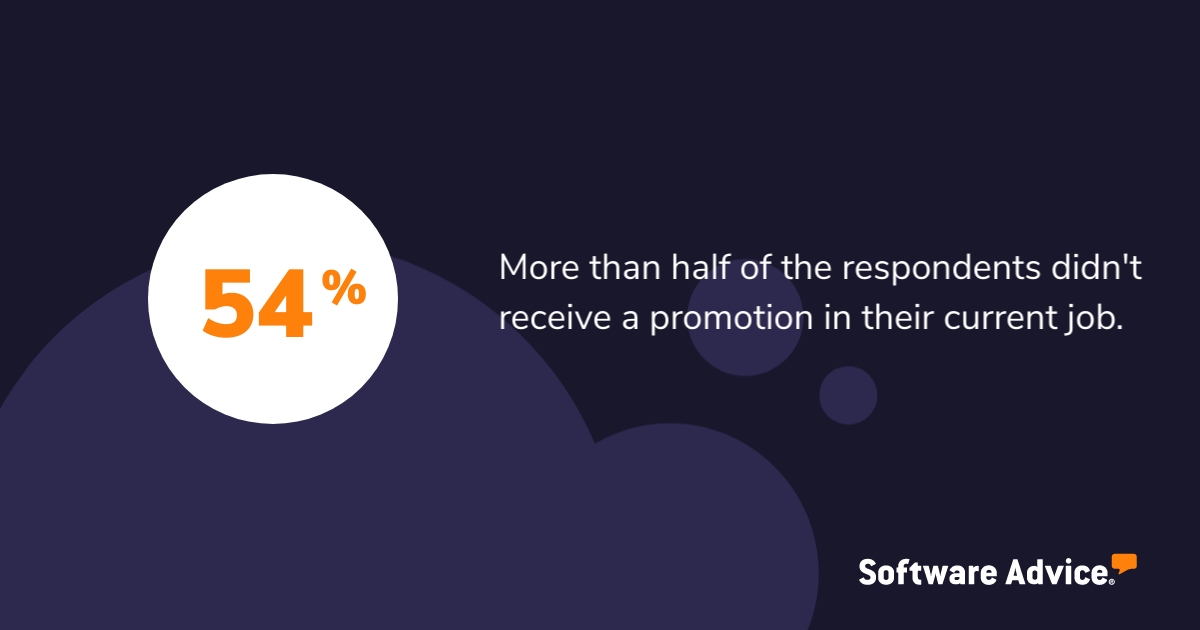
Out of the positive responses we got, 27% of the respondents said that ‘they received a promotion without having to ask for it’, 11% said that ‘they received a promotion because they asked once for it’, and the remaining 9% stated they ‘received a promotion because they asked multiple times for it’.
The aspect of career growth may be an essential factor for sticking with a job for a working individual. Organisations should ensure that employees feel valued and appreciated for their contribution. In addition, companies should also focus on individual employee growth in the workplace. Lastly, organisations can use employee recognition software to ensure employees feel more engaged and appreciated at work.
What are the current work circumstances of respondents?
To dive more deeply into understanding how working parents balance their personal and professional lives, we asked our respondents specific questions. Firstly, we questioned them on their current work circumstances —whether they work from home, office, in a hybrid set-up, or entirely remotely. This is what we got to know:
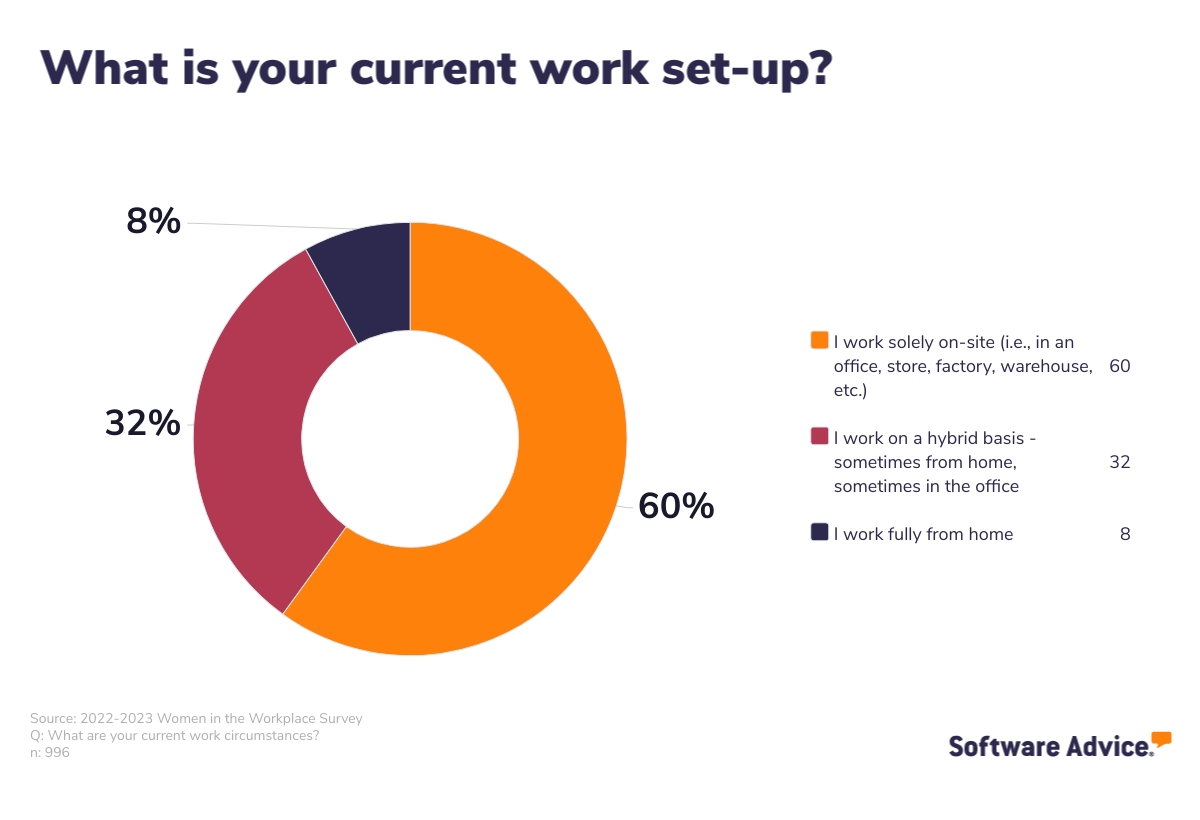
According to our survey data, the majority of the respondents (60%) are solely working on-site. The could be a result of living in the post-pandemic stage, wherein people might have once again started going to offices more regularly.
Majority find it hard to balance private and work-life
We further wanted to gain an understanding of how respondents are balancing private and work life. So, we specifically questioned all the respondents working remotely or in a hybrid set-up and who care for children at home whether or not they find it hard to maintain this balance. A combined total of 65% of respondents agreed that it is challenging to balance private and work life at home, with 43% saying it is ‘somewhat hard’ and 23% saying it is ‘very hard’. Moreover, 35% of the remaining respondents said they do not find it hard to maintain this balance.
Additionally, we asked respondents whether they feel the boundaries between work and private life are clear at home. This is what they said:
- Overall, 73% said they could separate their work and private life while working from home (out of which 82% male and 64% female participants expressed this view)
- 27% of them answered with ‘no’ and said they are not able to create such boundaries at home (out of which 18% male and 36% female participants expressed this view)
The data indicates that more female participants as compared to their male counterparts feel the boundaries between work and private life are not clear at home.
Issues faced by respondents while trying to balance this situation
Continuing in the same vein, we asked the 27% of respondents who said they could not create boundaries between work and private life on the different issues they regularly experience because of this. This is what we got to know:
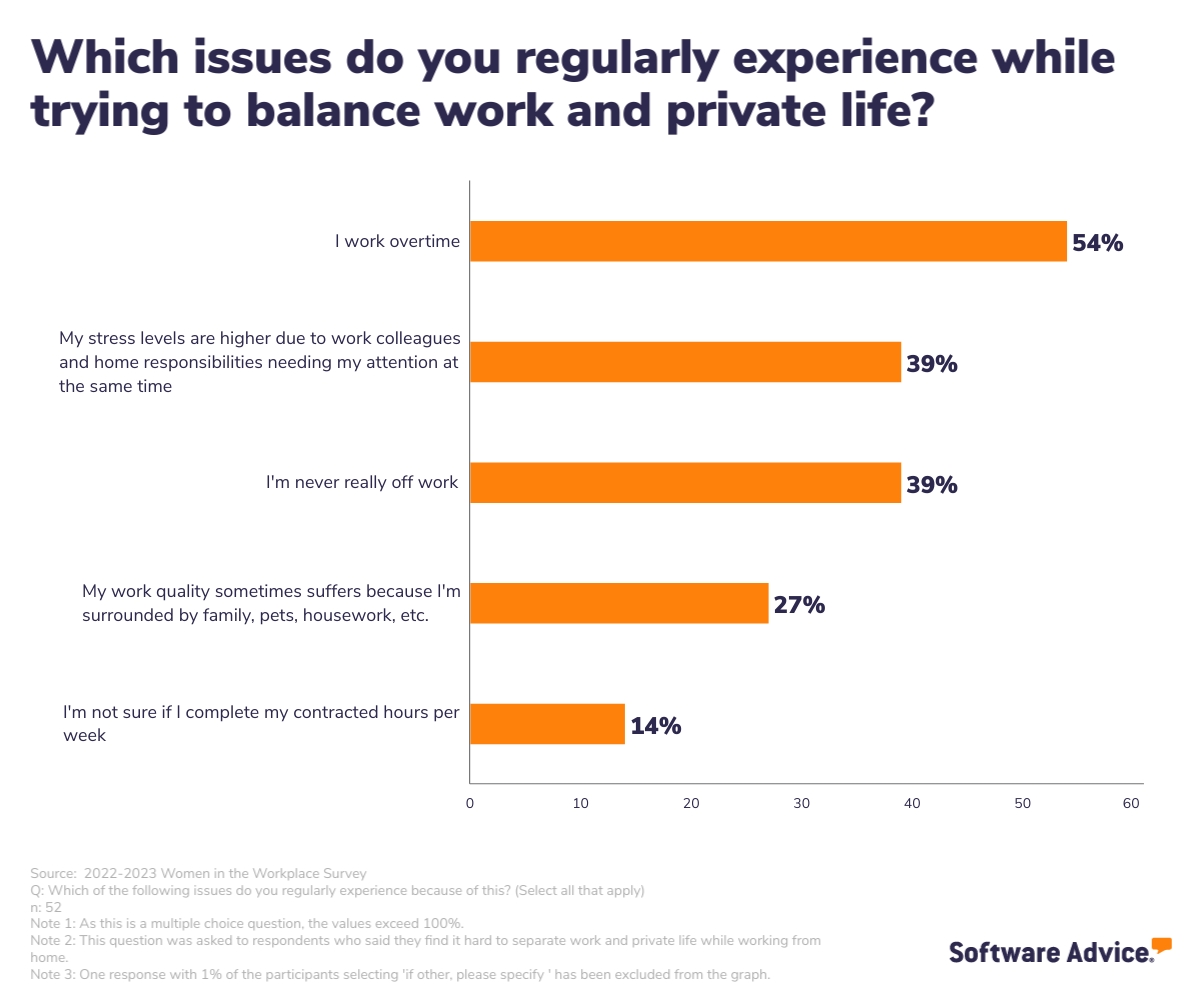
Clearly, for the majority of respondents (54%), working overtime is the biggest concern, followed by other reasons as depicted in the chart above.
Is there difficulty in managing child-related duties with work?
Out of the total number of 996 respondents, only 430 respondents had children under 18 with whom they live. To gather these parent respondents' views and working conditions, we asked them whether they find balancing child-related responsibilities with work responsibilities difficult. These are the responses we got:
- Overall, 51% of the respondents said they find it ‘somewhat difficult’ to balance child-related responsibilities with work responsibilities (out of which 46% male and 56% female participants expressed this view)
- 29% of the total subset of respondents said they do not find the task very difficult
- 11% of the parent survey-takers said it is ‘not difficult at all’
- 10% of the participants said they find it ‘very difficult’ (out of which 12% female and only 8% male respondents expressed this view)
Gathering the stats, we found that a combined total of 61% find difficulty in managing child-related responsibilities with work. Out of the overall 61% of respondents, 54% male and 68% female participants chose this option, indicating that more female respondents face difficulties in managing these responsibilities.
To further understand whether the situation is the same with parent respondents from other English and non-English-speaking countries as well, we compared the results to evaluate, and this is what we got to know:
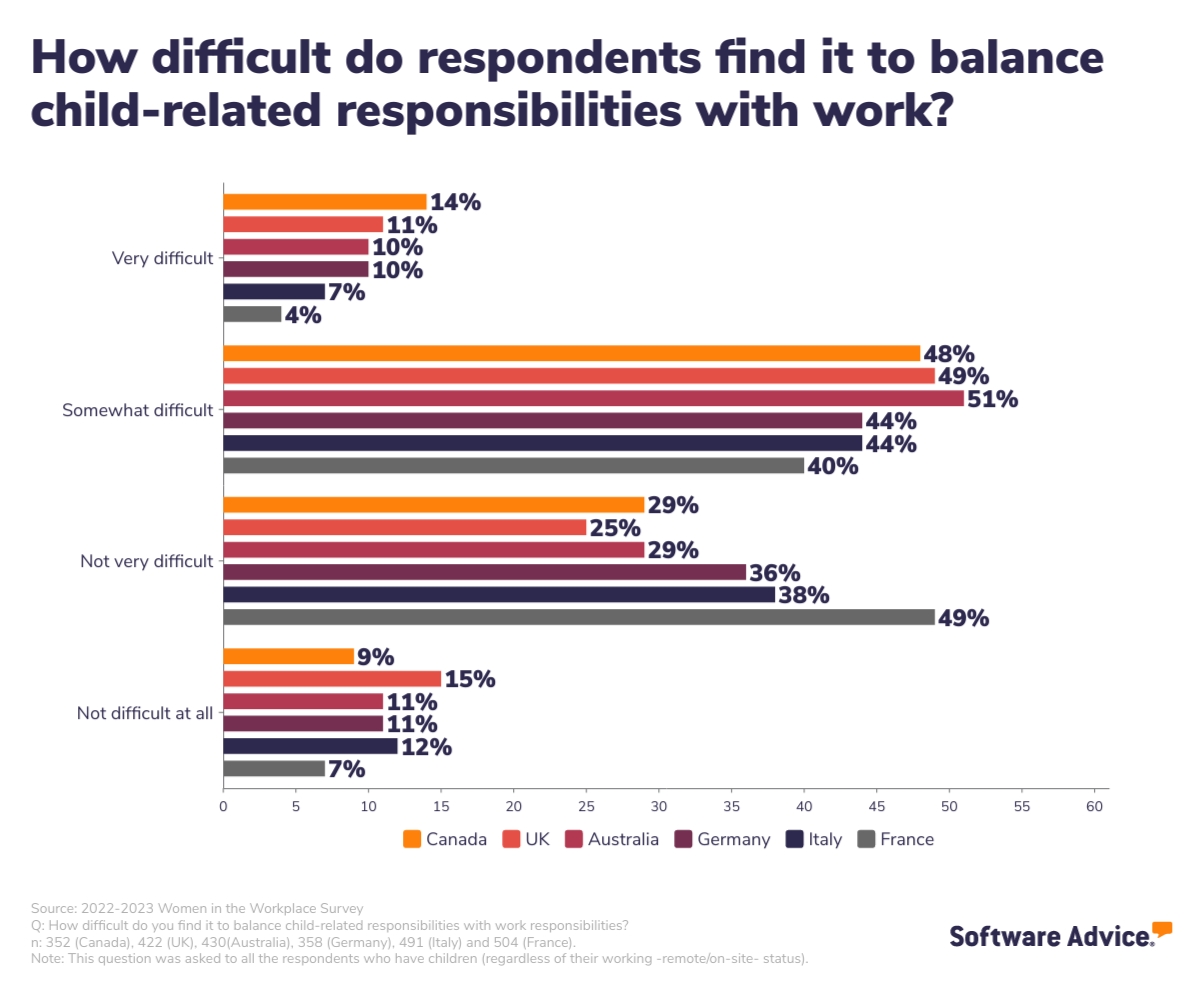
81% do not receive childcare resources from their company
Delving deeper, we asked these parent respondents whether they receive childcare resources from their company, and this is what they said:
- Overall, 81% of the respondents said ‘no’ to receiving childcare resources from their company (out of which 79% male and 84% female participants expressed this view)
- Out of the 17% who said ‘yes’ to receiving childcare resources, 19% male and 15% female respondents expressed this view.
- The remaining 2% of the respondents said they were unsure about the answer.
Are there any government-sponsored child-care resources available to Australians?
As per the Department of Education, Australia, ‘the Child Care Subsidy (CCS) is the main way the Australian Government helps families with child care fees’. There is a certain eligibility criterion that families need to meet to get CCS such as a family’s income, the age of the children, the type of care required, and more. In addition, there are typically four care types, including center-based day care, family day care, outside school hours cafe, and in-home care.
72% said ‘no’ to receiving extra bonus or financial help
On whether the parent respondents were provided with any extra bonus or financial assistance:
- Overall, 72% of the surveyed respondents said ‘no’ (out of which 63% male and 82% female participants chose this response)
- Only 21% of the total subset of respondents said ‘yes’ to receiving extra bonus/extra financial assistance from their company (out of which 29% male and only 12% female respondents expressed this view)
- The remaining 7% of them answered with ‘I’m not sure’
Over and above, the majority of the parent respondents were neither provided with childcare resources nor any extra bonus or financial assistance from their companies.
Is there a process to report harassment within companies?
To further evaluate the situation of respondents in the workplace, we asked them the following question: ‘Is there a process in place at work for employees to report harassment or make a complaint?’. To this, 73% of the respondents said ‘yes’, and only 12% of them answered ‘no’. The remaining 15% of the participants were unsure about the answer.
87% feel ‘comfortable’ about reporting harassment
To understand the comfort level of respondents about reporting an incident of workplace harassment, we asked them the following question: ‘How comfortable do you feel about reporting harassment (suffered by you or by another employee)?’. These are the answers we got:
- Overall, 34% of the respondents said they are ‘mostly comfortable’ about reporting harassment (out of which 39% male and 29% female participants expressed this view)
- 31% of them said they are ‘extremely comfortable’ (out of which 36% male and 27% female respondents chose this response)
- 22% said they are ‘moderately comfortable’
- A combined total of 13% of all respondents said they are ‘not comfortable’, with 11% saying they are ‘not very comfortable’ and 3% saying they are ‘not at all comfortable’
The data clearly shows that —on the whole— more male employees are comfortable reporting workplace harassment as compared to their female colleagues.
What is the degree of burnout respondents experience?
Moving forward, we asked all the respondents the degree of burnout they are experiencing (i.e., chronic workplace stress that has not been successfully managed). This is what we got to know:
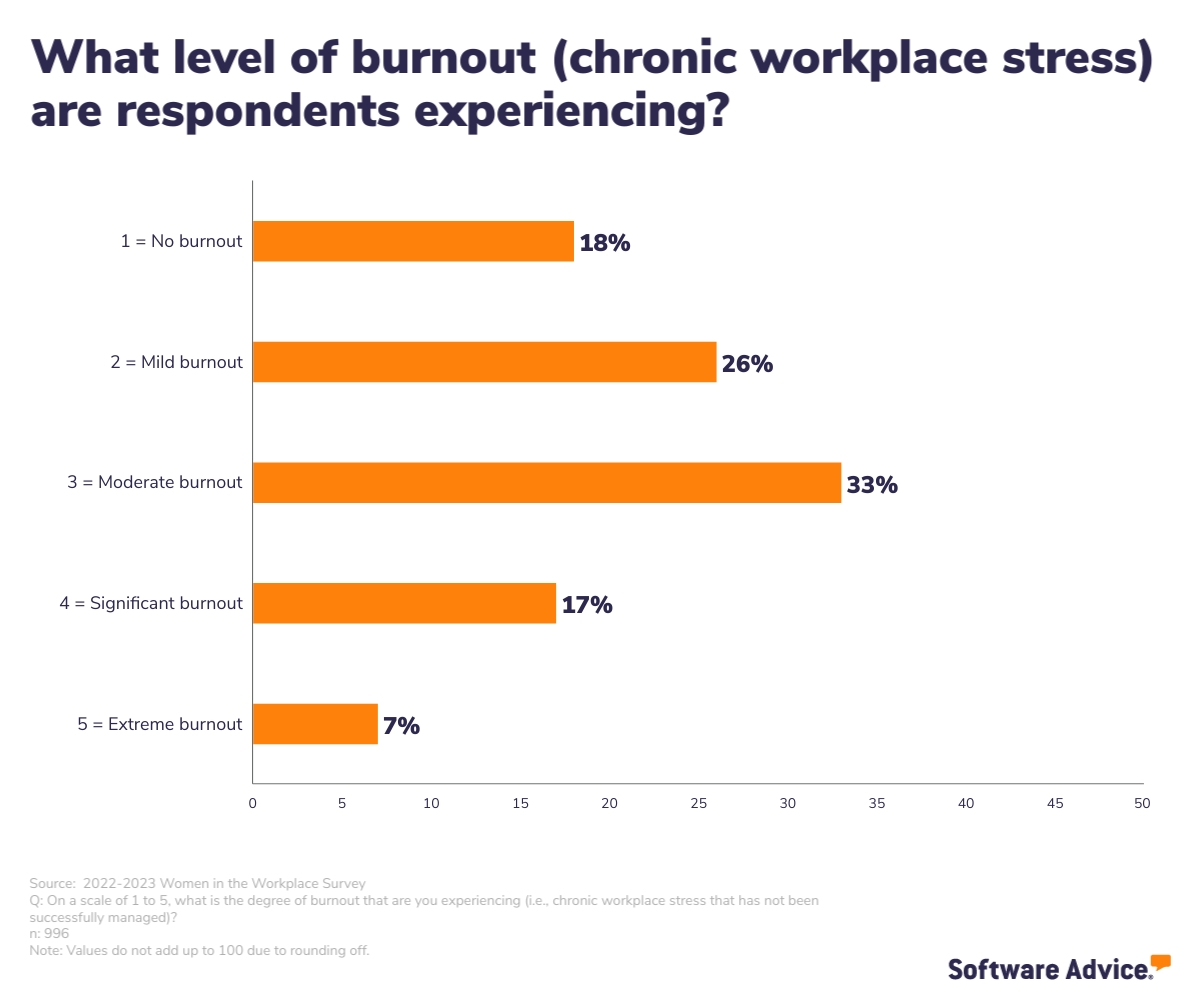
Overall, 17% of respondents are experiencing ‘significant burnout’ (out of which 12% male and 21% female participants expressed this view). In addition, the 7% who chose the response ‘extreme burnout’ included only 5% male and 8% female participants who expressed this view.
Therefore, we can say that, as per the data, more female respondents are experiencing ‘significant’ or ‘extreme’ burnout than their male counterparts. In addition, the ratio of men answering ‘no burnout’ (overall 18% in total respondents, with 22% male and 14% female respondents choosing this response) is more than that of female participants.
Do companies encourage employees to take paid mental health leaves?
Talking more about mental health, we asked respondents whether their company encourages them to take paid mental health leave (i.e., paid leave to take care of their mental health). We got the following responses:
- 52% said ‘no’, stating that their companies do not encourage such activities
- 48% answered with ‘yes’

In conclusion
As per our survey results, the majority of the respondents find it hard to balance work and private life, especially when they are working remotely or in a hybrid set-up and have to take care of children at home. Organisations can perhaps include more policies and methods that can help employees manage all such responsibilities. Some such methods could include providing flexible work schedules, giving more recognition and bonuses, and helping employees work on their individual goals.
Having said that, organisations should also focus on the mental health of employees and try and provide different resources to them for their development. Some such ways could include providing generous paid time off, free therapy sessions, comprehensive health insurance, nutritious food options for those working on-site, and discounts to local gyms or sports centres.
Methodology
To collect data for this report, Software Advice conducted an online survey from 22 December 2022 to 4 January 2023 in the following countries: Australia (996 respondents, including 460 male and 536 female participants), Canada (982 respondents, including 481 male and 501 female participants), Germany (994 in total including 515 male and 479 female respondents), France (1,013 total participants, including 514 male and 499 female survey-takers), Italy (996 in total including 513 male and 483 female participants), and the UK (1,001 total respondents, including 486 male and 515 female participants). The selection criteria for participants were as follows:
- Resident in Australia, Canada, Germany, France, Italy, and the UK
- Over 18 and below 65 years old
- Either employed full-time/part-time or on a maternity/paternity leave
- Has organisational seniority level above intern
- Identifies as either male or female
- Has a temporary or permanent (either full-time or part-time) workplace contract
This article may refer to products, programs or services that are not available in your country, or that may be restricted under the laws or regulations of your country. We suggest that you consult the software provider directly for information regarding product availability and compliance with local laws.
